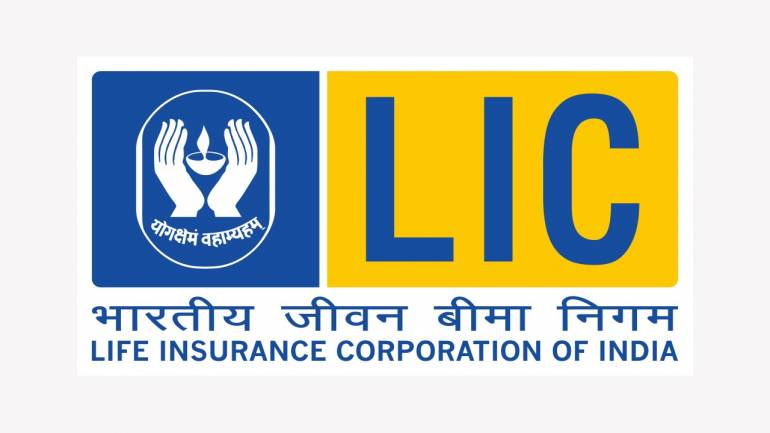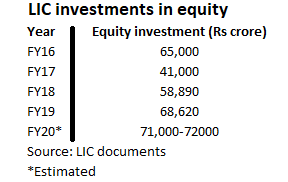EXCLUSIVE: LIC’s equity investment in FY20 likely to reach above Rs 70,000 cr, an all-time high

Life Insurance Corporation of India (LIC) is likely to end FY20 with an all-time high equity investment (gross) of around up to 72,000 crore, an all-time high, sources said. In FY19, LIC invested around Rs 68,620 crore into the equity market.
“We have already crossed Rs 33,000 crore and the second half of the year is expected to be robust considering the new business premiums have also seen a high growth,” said an official.
While the year-on-year (YoY) growth will be 3.5 percent, LIC’s equity investments hold significance because it is the largest domestic institutional investor in the country. In 2019, LIC is looking to invest Rs 3.49 lakh crore into debt and equities.
In the first half of FY20 itself, LIC has invested around Rs 33,500 crore in the equity markets. The second half (H2) is better in terms of investments since individuals start buying life insurance for tax saving purposes from October onward. The policyholder funds are used for investment purposes.

BSE Sensex rose by 1414.61 points in the April to November period to touch 40,286.48 on November 14. A year ago, the BSE Sensex stood at 35,260.54 on November 15 and since then the index has seen both domestic, as well as external factors, causing frequent volatilities.
LIC did not respond to a query sent by Moneycontrol.
The policyholder funds of LIC are invested into both equity and debt instruments. Being a long-term business, a larger portion of the funds are invested into government securities and other guaranteed instruments.
The market value of LIC’s investment as at the end of FY19 stood at around Rs 28.7 crore, growing YoY by 8.6 percent. The insurer’s total assets had touched an all-time high of Rs 31 crore in FY19, which was a 9.4 percent rise.
How LIC invests
While investing in the equity markets, LIC follows a ‘contrarian’ investment strategy, which is ‘sell’ when the sentiment is bullish and ‘buy’ when the mood is bearish.
Every year, the life insurer books a profit of Rs 18,000 crore to Rs 25,000 crore in equity profits alone. In FY19, LIC had an equity profit booking of around Rs 23,600 crore which was lower than the Rs 25,650 crore of the year ago.
Since FY17, there has been a consistent jump in the equity investments. That particular financial year (FY17) saw LIC investing only Rs 41,000 crore into equities since it took a conscious call to keep its share market investments lower.
However, the very next year it saw a huge spike making an equity investment of Rs 58,890 crore. This was an indicator that the insurer was ready to take calculated bets in the stock market.
LIC added Rs 58,881.7 crore in equity investments in FY18 taking the total to Rs 4.6 lakh crore, a growth of 18 percent YoY.
In the last financial year, a huge spike in the equity investment was aided by the 51 percent stake acquisition in IDBI Bank by LIC. The life insurer infused Rs 21,600 crore while buying a 51 percent stake in IDBI Bank and had sought the government assistance in funding the bank.
Despite the short-term pain, LIC’s equity holding value remains intact. Data compiled by Moneycontrol showed that LIC’s equity holding value was at Rs 5.98 lakh crore at the end of the June quarter of FY20.
Between June 2016 and June 2019, the value of LIC’s equity holding rose by almost Rs 2.31 lakh crore. LIC saw a 62.7 percent rise in the value of its equity holding over the past three years (June 2016-June 2019). The value rose by Rs 74,781 crore in FY19 itself.
Premium growth to boost investments
Since the equity investments are made out of the policyholder’s funds, a rise in new premium collection also means good news for the stock market investments by LIC.
Life insurance companies posted a 31.8 percent YoY growth in first-year premium collections for the April to October 2019 period at Rs 1.43 lakh crore. LIC outdid most of the competition, with new premium growth of 37.7 percent YoY at Rs 1.01 lakh crore.
At the end of October, LIC held a market share of 70.9 percent while private insurers held 29.1 percent based on the new premium collection.
[“source=moneycontrol”]




